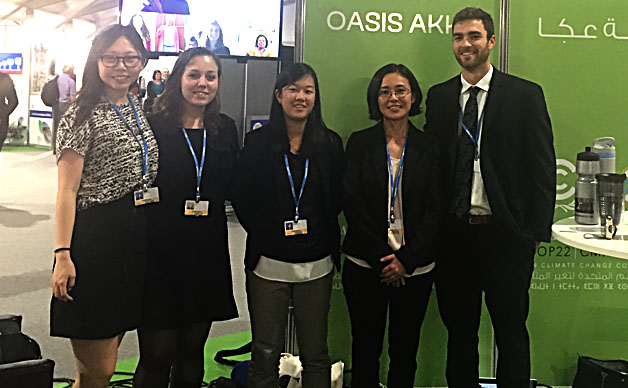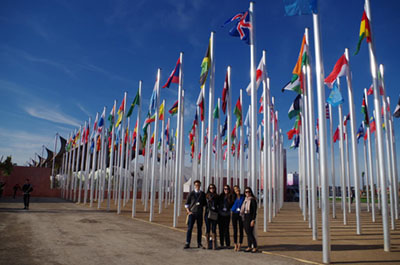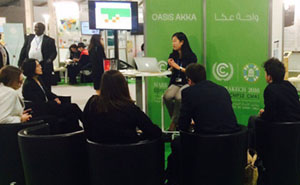Turner Environmental Law Clinic students recall trip to climate change convention in Morocco

Marrakech, Morocco
In November 2016, The Turner Environmental Law Clinic sent Kate Lee 16L (a fellow in the clinic from 2014 to 2016) and Jin Lee 17L (a current student in the clinic) to Marrakech, Morocco, to attend the 22nd annual Conference of the Parties (COP22) held under the UN Framework Convention on Climate Change.
Both students recently shared their experiences at the conference. Kate who is now the policy manager at Southeast Energy Efficiency Alliance, describes leaving with a sense of renewed purpose, and Jin suggests that pessimism doesn’t create solutions. Read excerpts from their stories below:
Kate Lee
 At COP21, held last year in Paris, nearly 200 countries agreed to limit global climate change to 2 degrees Celsius under the Paris Agreement. The aim of COP22 was to iron out many of the details needed to implement the Paris Agreement and achieve its important goal. I was thrilled to attend COP22 as part of Emory University's delegation, representing the Turner Environmental Law Clinic in my role as clinical fellow.
At COP21, held last year in Paris, nearly 200 countries agreed to limit global climate change to 2 degrees Celsius under the Paris Agreement. The aim of COP22 was to iron out many of the details needed to implement the Paris Agreement and achieve its important goal. I was thrilled to attend COP22 as part of Emory University's delegation, representing the Turner Environmental Law Clinic in my role as clinical fellow.
Going into the conference, I looked forward to sharing the clinic’s recent work on Clean Power Plan implementation in the Southeastern US, learning more about how international treaties are negotiated and implemented, and supporting the worldwide climate movement. The conference certainly delivered on all of this and more. But, like many of the other COP22 attendees, I was shocked to wake up on November 9 to the news that Donald Trump—a climate denier—had won the US presidential election.
While the election results certainly cast somewhat of a shadow over the conference, it also seemed to instill conference participants with a renewed determination. In the days after the election, over 190 governments agreed to the Marrakech Action Proclamation, reaffirming their commitment to climate action and sustainable development. And more than 365 businesses, including dozens of Fortune 500 companies, sent a public message to global leaders in support of the Paris Agreement and the need for a low-carbon economy.
Though I was only at COP22 to observe, I too left Marrakech with a new sense of purpose and motivation. The Turner Environmental Law Clinic’s work to promote sustainable energy, sustainable agriculture will only become more critical in an era of uncertain U.S. climate leadership. Equally important is the Turner Clinic’s mission to inspire and train the next generation of environmental attorneys. Strong environmental leadership will be critically important to fighting global climate change in the years to come.
Jin Lee
 From my perspective, there were only reports of gloom and doom for achieving the 2-degree-Celsius goal of the Paris Agreement, and so, I flew to Morocco with overcast hopes. However, Morocco dispelled the dreariness of the media’s forecast on climate change. Beginning with the first panelist discussion I attended for the week, everyone had the same message: no one nation has the power to stop the momentum towards a cleaner, healthier environment. Large multinational companies assured the audience they were going to continue investing in renewable energy solutions and in building a low-carbon economy. To them, it would be bad for their business not to invest. Markets are already shifting toward a low-carbon economy. With climate change impacting communities in unprecedented ways, financiers now require businesses to be resilient to those changes.
From my perspective, there were only reports of gloom and doom for achieving the 2-degree-Celsius goal of the Paris Agreement, and so, I flew to Morocco with overcast hopes. However, Morocco dispelled the dreariness of the media’s forecast on climate change. Beginning with the first panelist discussion I attended for the week, everyone had the same message: no one nation has the power to stop the momentum towards a cleaner, healthier environment. Large multinational companies assured the audience they were going to continue investing in renewable energy solutions and in building a low-carbon economy. To them, it would be bad for their business not to invest. Markets are already shifting toward a low-carbon economy. With climate change impacting communities in unprecedented ways, financiers now require businesses to be resilient to those changes.
Other countries began implementing methods to meet their national determined contributions and are now looking for innovative solutions to meet their goals. To pull out of the Paris Agreement would be a diplomatic nightmare for the United States as other nations view climate change a core element to international cooperation. Moreover, cities and states in the United States are establishing their own climate agenda to address the impacts of climate change already affecting them.
A skeptic would find it hard to swallow all this optimism. Only those dedicated to mitigating and adapting to climate change attend COP. Neither Exxon Mobil nor Shell showed up. No representatives from North Dakota (think, Dakota Access Pipeline) or Alberta (Keystone XL) showed up either.
But, in the end, nothing good comes out of being a skeptic. Hypothesizing about the worst-case scenarios for climate change under the new administration does not get us closer to meeting the Paris goals. Expending energy reading about how the new administration could suffocate the EPA, reinvigorate the coal industry, or roll back on renewable subsidies may be captivating, but it provides no real solution.
At COP, people recognized these new problems that could arise with the new administration. But instead of stopping there, they immediately began addressing them. Countries with large and small economies recommitted to the Paris Agreement, and set lofty goals for themselves. Maybe, just maybe, the world needed the threat of President-elect Trump’s reversal on the United States’ climate change policy to accelerate this growing momentum toward a low-carbon economy, such that the 2-degree-Celsius goal of the Paris Agreement could be met. So, I guess, you can call me a COP-timist.
The Turner Environmental Law Clinic provides important pro bono legal representation to individuals, community groups, and nonprofit organizations that seek to protect and restore the natural environment for the benefit of the public. Through its work, the clinic offers students an intense, hands-on introduction to environmental law and trains the next generation of environmental attorneys.